Cuba and US a Step Closer to Reopening Embassies

— -- Both sides expressed optimism today that Cuba and the United States will soon resume normal diplomatic relations, with the goal of opening embassies in both countries as early as April.
Roberta Jacobson, leading the U.S. delegation, said the embassies could be reopened before the April Summit of the Americas, April 10-11 in Panama. Both Presidents Obama and Raul Castro will be in attendance and it could be their first meeting since the announcement to restore diplomatic ties in December.
“I'm very encouraged that we will have an embassy functioning in Havana that is able to do its work,” Jacobson, the U.S. Assistant Secretary of State for Western Hemisphere Affairs, said.
Adding, in response to a question: "I do think we can get this done in time for the Summit of the Americas."
For the Cubans, two big issues are still on the table: remaining on the U.S. terrorist watch list and issues surrounding their inability to work with U.S. banks at their Interest Section, which results in all transactions being in cash.
Josefina Vidal on the Cuban side even emphasized that one issue is not a precondition for the other.
Vidal says it would be difficult for Cuba to consider relations completely normalized while it remains designated as a terrorist state. But she considered the opening of embassies and establishing a relationship separate from the steps being taken to establish full normalization.
"What we are saying is, It's not a precondition. Not a condition. But is a very important issue for Cuba … we hope is addressed and solved," added Vidal, who's leading the negotiations for Cuba.
The United States has taken the first step toward removing Cuba from that list, undertaking a review, which when completed must be submitted to Congress prior to Cuba’s being taken off the list of State Sponsors of Terrorism.
The delegations announced a series of bilateral meetings, a half dozen, held over the next few weeks to discuss other concerns, including human rights, marine protected areas, protection of migration front and regulation issues.
And the two sides have agreed to maintain “permanent communication” as they move forward.
“In our case not compromising on our values but to try and resolve this so we can have the kind of relationship,” Jacobson said. “We made sufficient progress on enough [issues]. Some of them are close to resolution, others we have to take back to our respective leadership.”



